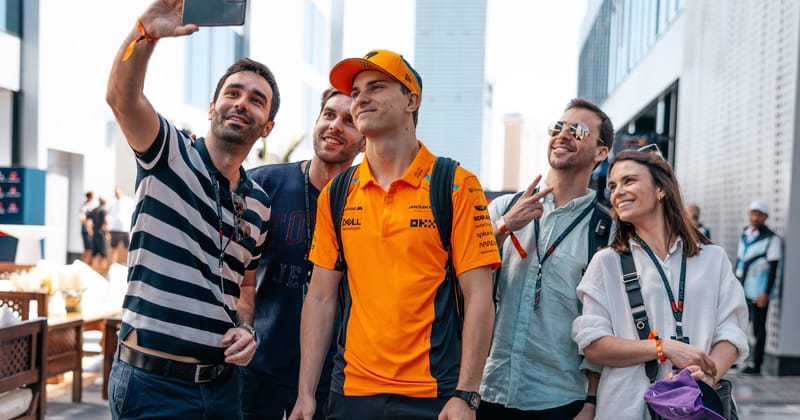
Unpacking Oscar’s reputation as one of F1’s calmest characters
Pressure, fame and the media spotlight: Oscar on how he’s dealt with the step up to F1
Read time: 12 minutes
How many times over the last 18 months have you seen Oscar’s calmness and strength of character praised? For those embedded in the day-to-day of Formula 1? Most likely, a lot. For those who primarily stick to just watching the races? Also, probably quite a lot.
Oscar described his Azerbaijan Grand Prix victory as the “most stressful afternoon” of his life, but those watching on wouldn’t have known it, with the Australian appearing calm and composed as he fended off Charles Leclerc to collect his second F1 win.
Since stepping up from Formula 2, the Australian has developed a reputation as one of F1’s coolest characters, able to keep his emotions in check whenever he steps into his car, whatever the scenario.
“Some people need a bit of riling up and stuff like that to really get the most out of themselves. For me, staying calm is very important,” he says. “I think it's how I make my best decisions with a clear mind.”
Sure, there are moments that anger him, and he certainly doesn’t fear speaking his mind, but his frankness never becomes aggressive. In situations where others may lose their temper, Oscar still speaks with the same calming tone, and often with a hint of irony.

Anything else would be counterintuitive to his way of working, even if he feels he’s on the wrong end of an unfair decision or has seen his race ruined through no fault of his own.
“It's very easy to become distracted from things that go wrong on or off the track because you’ve got a lot of tension on you and a lot of people saying things,” he says. “It would be very, very easy to become distracted, so focusing on what is important by being mentally strong, and having good self-confidence and self-belief helps.”
Especially in Formula 1, where every detail counts.
“Until recently, I guess it was an untapped area of performance in F1,” he continues. “It is very important to find all the gains you can. Just as the engineers are trying to get milliseconds out of the car, you’re trying to get milliseconds out of yourself. So, putting yourself in the right frame of mind is very important.”

Building on his natural calmness
Oscar’s childhood was unusual, even in comparison to many of his peers. The Australian moved to England when he was just 14 years old, initially living with his dad for six months before going it alone as he chased a career in F1.
Plenty of routes into F1 exist, but Europe’s karting and junior racing scene is so strong that those competing within it stand a much greater chance of making it than those who aren’t.
Oscar is among a select few on the grid, including compatriot Daniel Ricciardo and former F2 rivals Guanzyu Zhou and Yuki Tsunoda, who took the plunge at a young age and moved to Europe. Relocating from Australia to England, Oscar had to adjust to living away from his parents and everything this entails. The mental toughness this took means there’s now little that phases him.
“Making a conscious effort to think about what you need to improve, and not letting the other things distract you from doing that, is very important”

Oscar Piastri
McLaren Formula 1 Driver
“The decisions I had to make to reach F1 ingrains it in you that you need to work hard and just get on with things, which has helped me a lot,” he explains. “Of course, I had help from my parents, but only over the phone, so there’s a lot of situations I experienced for the first time at a young age that I had to figure out for myself, from buying my own food to moving in somewhere for the first time. It teaches you independence and to know what is important and what isn’t.”
Although those experiences have undoubtedly shaped him, Oscar believes his calmness comes naturally and that these experiences have built on an already relaxed temperament.
“In racing, there are a lot of things you can’t control, a lot can and often does go wrong,” he continues. “It is a very easy sport to become frustrated in, so making a conscious effort to think about what you need to improve, and not letting the other things distract you from doing that, is very important.”
Staying cool, calm & collected
Remaining the same as life changed around him
In many ways, Oscar’s life has changed very little in the years since he moved to England. He spends his time in a similar way, whether that be with his girlfriend, his friends or relaxing in front of Netflix or on the simulator.
However, if you step back from the day-to-day, his life is vastly different. Retaining a similar way of life away from racing has helped him to cope with all of the change.
One difference is the lack of free time he gets, but he says that he’s found it relatively easy to adjust to that with the help of his team, who plan out his entire schedule. So, even though there is a lot less free time to play with, when he does get the chance to shut off, he’s able to spend it in the same way he would have four or five years ago.
Being a Formula 1 driver puts you in the media spotlight and comes with an expectation to perform that is hard to comprehend. Yet, he appears to have taken it all in his stride, while not allowing it to impact his character. He’s more mature, but at his core, Oscar remains the same person as he was during his junior racing days.

“Deep down, as a driver and a person, you know whether you're doing a good job or not, and I think I've got a good radar of that,” he says. “Using that as a guide and basing your happiness or satisfaction off that is a good way of working, rather than listening to what people have to say, whether it is positive or negative.
“In this day and age, it’s impossible to not see any media or social media, so although I never go searching for anything about myself, I think it’s natural that you see things, but ultimately, just because people are saying you did a good job, doesn’t mean that you are, and vice-versa.
“There are occasions where the results have been better than what I felt my performance was, and others when the results didn’t show what I thought was a really good performance. I feel like I’ve done a decent job, so it has all been pretty positive and not too demanding.”
Then there’s the support from fans - an incredible, performance-boosting feature of being a professional sportsperson, but also overwhelming if you’ve never experienced the sensation of hearing 1,000s of people chant your name in song.

However, Oscar was fortunate in that he spent a year as Alpine’s Reserve Driver prior to joining McLaren, which provided valuable exposure to F1’s incredible and vast fanbase at races and other engagements.
“That’s one thing you can’t really prepare for: being ‘somewhat famous’,” he explains. “That probably took me the longest to get used to, but my year as a Reserve Driver gave me a decent insight into what it would be like, and I feel I adjusted to it relatively quickly.
“Ultimately, you never want to disappoint the fans. It’s very cool to have all that support and to have people cheering me on at races - it is pretty special. They're always there, good, bad or otherwise, which is very nice for me and the team. I think our fans have a very good culture in how they support the team and help us stay together and move forwards.
“But it can be strange because I feel like I am not a different person to who I was three or four years ago, when not many people knew who I was. It’s cool, but a little strange to get used to.”
Adjusting to being in the spotlight
Influenced by experience
As Oscar says, he’s changed very little since stepping onto the official Road to F1 in 2020, including how he prepares for races.
His pre-race ritual is as simplistic as when he was racing in Formula 3. A warm-up to loosen and limber himself up and a period of time on his own, spent switching off and getting in the zone. Nothing overcomplicated that could clutter the mind, just total focus.
It works for him and keeps him calm in the car, helping him to shut out any external noise. Over the years, his body has become attuned to this carefully curated warm-up and knows that when it’s performed, he’s about to clamber into the car.

OP81 Collection
These decisions and ways of working have all been guided by his team, which includes former F1 driver Mark Webber alongside Anne Webber. The pair have vast experience of what it takes to thrive in F1 and have been able to guide him though the last few years.
“I think it could have been easy to fall into the trap of thinking that it was just another step up from F2, like when I stepped-up from each of the junior categories, but it’s very different in a lot of aspects, so I think it was just generally trying to remove the naivety,” he says, when asked how Mark and Anne prepared him for the step up to Formula 1.
“When you get to F1, it really changes everything. You’re one of two drivers representing close to 1,000 people in the team, millions of McLaren fans, and all of our partners. Things change very quickly, and they were able to prepare me for what was to come and warn me of the challenges.”
Related articles

Oscar Piastri's road to victory

How Oscar Piastri won the Azerbaijan Grand Prix

How Oscar became a Formula 1 Grand Prix winner

Quiz: What can you remember from our back-to-back wins

Will Courtenay to join McLaren Formula 1 Team as Sporting Director

How does strategy change when you’re leading the pack? – Presented by FxPro






